Animal Testing in Psychological Research Proposal 2022
VerifiedAdded on 2022/09/10
|9
|2078
|31
AI Summary
Contribute Materials
Your contribution can guide someone’s learning journey. Share your
documents today.
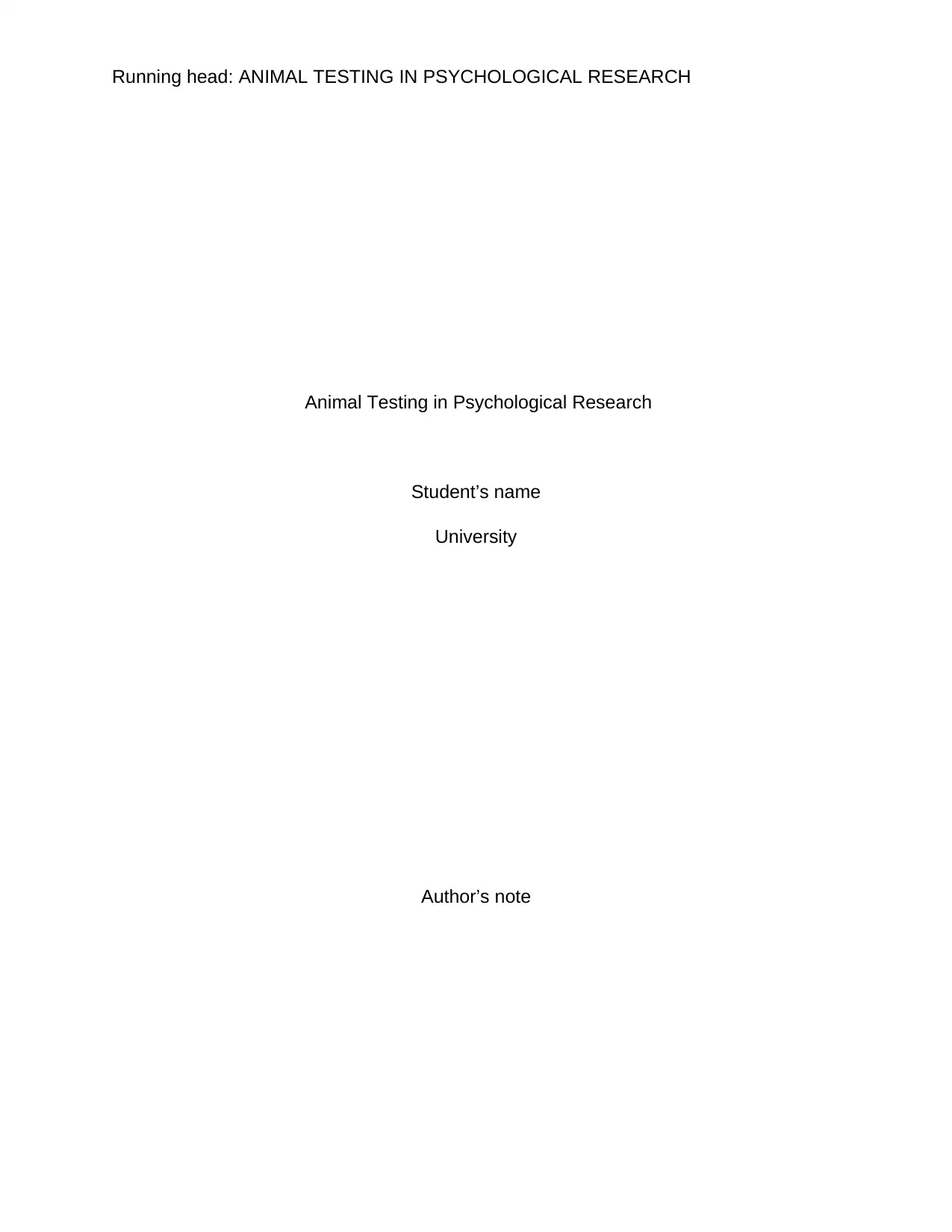
Running head: ANIMAL TESTING IN PSYCHOLOGICAL RESEARCH
Animal Testing in Psychological Research
Student’s name
University
Author’s note
Animal Testing in Psychological Research
Student’s name
University
Author’s note
Secure Best Marks with AI Grader
Need help grading? Try our AI Grader for instant feedback on your assignments.
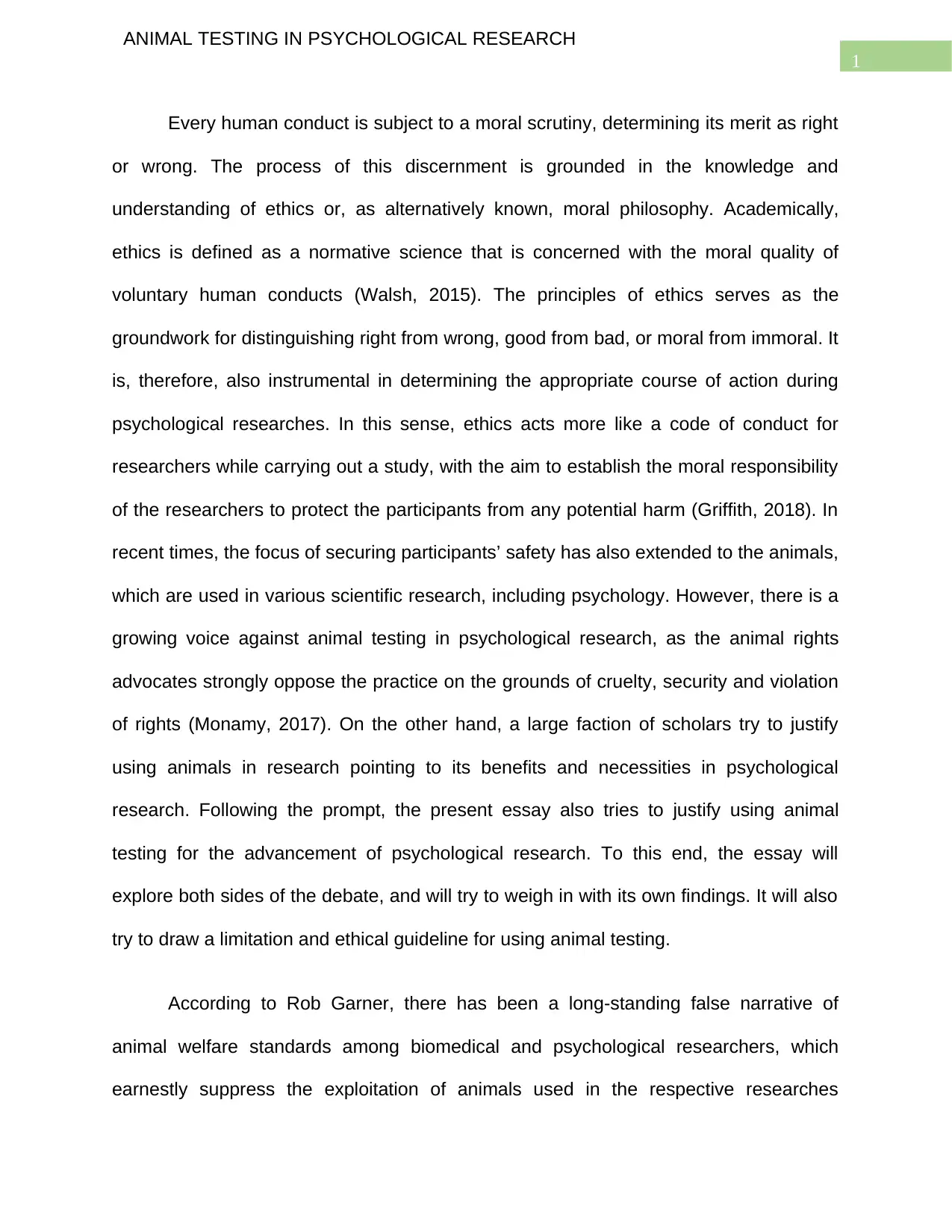
1
ANIMAL TESTING IN PSYCHOLOGICAL RESEARCH
Every human conduct is subject to a moral scrutiny, determining its merit as right
or wrong. The process of this discernment is grounded in the knowledge and
understanding of ethics or, as alternatively known, moral philosophy. Academically,
ethics is defined as a normative science that is concerned with the moral quality of
voluntary human conducts (Walsh, 2015). The principles of ethics serves as the
groundwork for distinguishing right from wrong, good from bad, or moral from immoral. It
is, therefore, also instrumental in determining the appropriate course of action during
psychological researches. In this sense, ethics acts more like a code of conduct for
researchers while carrying out a study, with the aim to establish the moral responsibility
of the researchers to protect the participants from any potential harm (Griffith, 2018). In
recent times, the focus of securing participants’ safety has also extended to the animals,
which are used in various scientific research, including psychology. However, there is a
growing voice against animal testing in psychological research, as the animal rights
advocates strongly oppose the practice on the grounds of cruelty, security and violation
of rights (Monamy, 2017). On the other hand, a large faction of scholars try to justify
using animals in research pointing to its benefits and necessities in psychological
research. Following the prompt, the present essay also tries to justify using animal
testing for the advancement of psychological research. To this end, the essay will
explore both sides of the debate, and will try to weigh in with its own findings. It will also
try to draw a limitation and ethical guideline for using animal testing.
According to Rob Garner, there has been a long-standing false narrative of
animal welfare standards among biomedical and psychological researchers, which
earnestly suppress the exploitation of animals used in the respective researches
ANIMAL TESTING IN PSYCHOLOGICAL RESEARCH
Every human conduct is subject to a moral scrutiny, determining its merit as right
or wrong. The process of this discernment is grounded in the knowledge and
understanding of ethics or, as alternatively known, moral philosophy. Academically,
ethics is defined as a normative science that is concerned with the moral quality of
voluntary human conducts (Walsh, 2015). The principles of ethics serves as the
groundwork for distinguishing right from wrong, good from bad, or moral from immoral. It
is, therefore, also instrumental in determining the appropriate course of action during
psychological researches. In this sense, ethics acts more like a code of conduct for
researchers while carrying out a study, with the aim to establish the moral responsibility
of the researchers to protect the participants from any potential harm (Griffith, 2018). In
recent times, the focus of securing participants’ safety has also extended to the animals,
which are used in various scientific research, including psychology. However, there is a
growing voice against animal testing in psychological research, as the animal rights
advocates strongly oppose the practice on the grounds of cruelty, security and violation
of rights (Monamy, 2017). On the other hand, a large faction of scholars try to justify
using animals in research pointing to its benefits and necessities in psychological
research. Following the prompt, the present essay also tries to justify using animal
testing for the advancement of psychological research. To this end, the essay will
explore both sides of the debate, and will try to weigh in with its own findings. It will also
try to draw a limitation and ethical guideline for using animal testing.
According to Rob Garner, there has been a long-standing false narrative of
animal welfare standards among biomedical and psychological researchers, which
earnestly suppress the exploitation of animals used in the respective researches
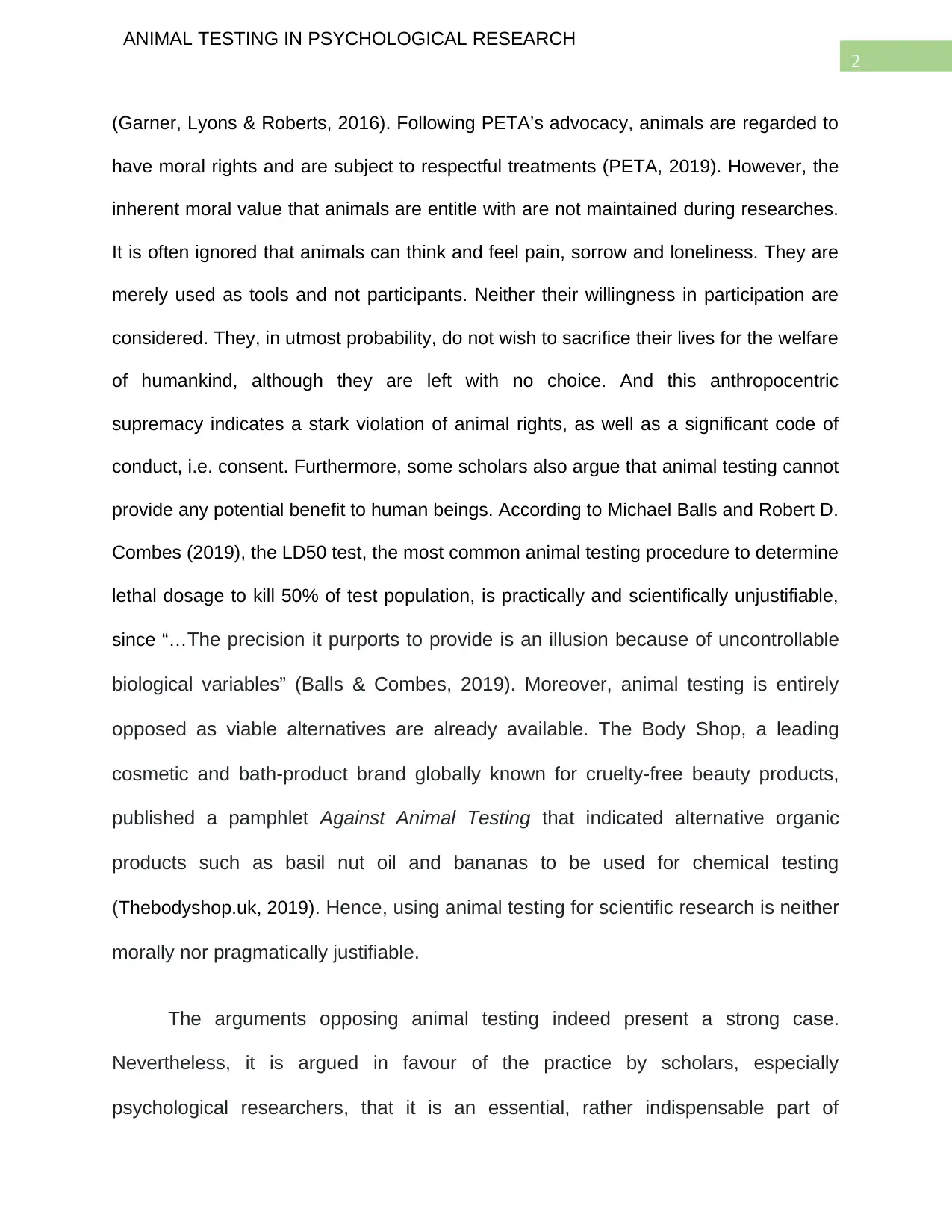
2
ANIMAL TESTING IN PSYCHOLOGICAL RESEARCH
(Garner, Lyons & Roberts, 2016). Following PETA’s advocacy, animals are regarded to
have moral rights and are subject to respectful treatments (PETA, 2019). However, the
inherent moral value that animals are entitle with are not maintained during researches.
It is often ignored that animals can think and feel pain, sorrow and loneliness. They are
merely used as tools and not participants. Neither their willingness in participation are
considered. They, in utmost probability, do not wish to sacrifice their lives for the welfare
of humankind, although they are left with no choice. And this anthropocentric
supremacy indicates a stark violation of animal rights, as well as a significant code of
conduct, i.e. consent. Furthermore, some scholars also argue that animal testing cannot
provide any potential benefit to human beings. According to Michael Balls and Robert D.
Combes (2019), the LD50 test, the most common animal testing procedure to determine
lethal dosage to kill 50% of test population, is practically and scientifically unjustifiable,
since “…The precision it purports to provide is an illusion because of uncontrollable
biological variables” (Balls & Combes, 2019). Moreover, animal testing is entirely
opposed as viable alternatives are already available. The Body Shop, a leading
cosmetic and bath-product brand globally known for cruelty-free beauty products,
published a pamphlet Against Animal Testing that indicated alternative organic
products such as basil nut oil and bananas to be used for chemical testing
(Thebodyshop.uk, 2019). Hence, using animal testing for scientific research is neither
morally nor pragmatically justifiable.
The arguments opposing animal testing indeed present a strong case.
Nevertheless, it is argued in favour of the practice by scholars, especially
psychological researchers, that it is an essential, rather indispensable part of
ANIMAL TESTING IN PSYCHOLOGICAL RESEARCH
(Garner, Lyons & Roberts, 2016). Following PETA’s advocacy, animals are regarded to
have moral rights and are subject to respectful treatments (PETA, 2019). However, the
inherent moral value that animals are entitle with are not maintained during researches.
It is often ignored that animals can think and feel pain, sorrow and loneliness. They are
merely used as tools and not participants. Neither their willingness in participation are
considered. They, in utmost probability, do not wish to sacrifice their lives for the welfare
of humankind, although they are left with no choice. And this anthropocentric
supremacy indicates a stark violation of animal rights, as well as a significant code of
conduct, i.e. consent. Furthermore, some scholars also argue that animal testing cannot
provide any potential benefit to human beings. According to Michael Balls and Robert D.
Combes (2019), the LD50 test, the most common animal testing procedure to determine
lethal dosage to kill 50% of test population, is practically and scientifically unjustifiable,
since “…The precision it purports to provide is an illusion because of uncontrollable
biological variables” (Balls & Combes, 2019). Moreover, animal testing is entirely
opposed as viable alternatives are already available. The Body Shop, a leading
cosmetic and bath-product brand globally known for cruelty-free beauty products,
published a pamphlet Against Animal Testing that indicated alternative organic
products such as basil nut oil and bananas to be used for chemical testing
(Thebodyshop.uk, 2019). Hence, using animal testing for scientific research is neither
morally nor pragmatically justifiable.
The arguments opposing animal testing indeed present a strong case.
Nevertheless, it is argued in favour of the practice by scholars, especially
psychological researchers, that it is an essential, rather indispensable part of
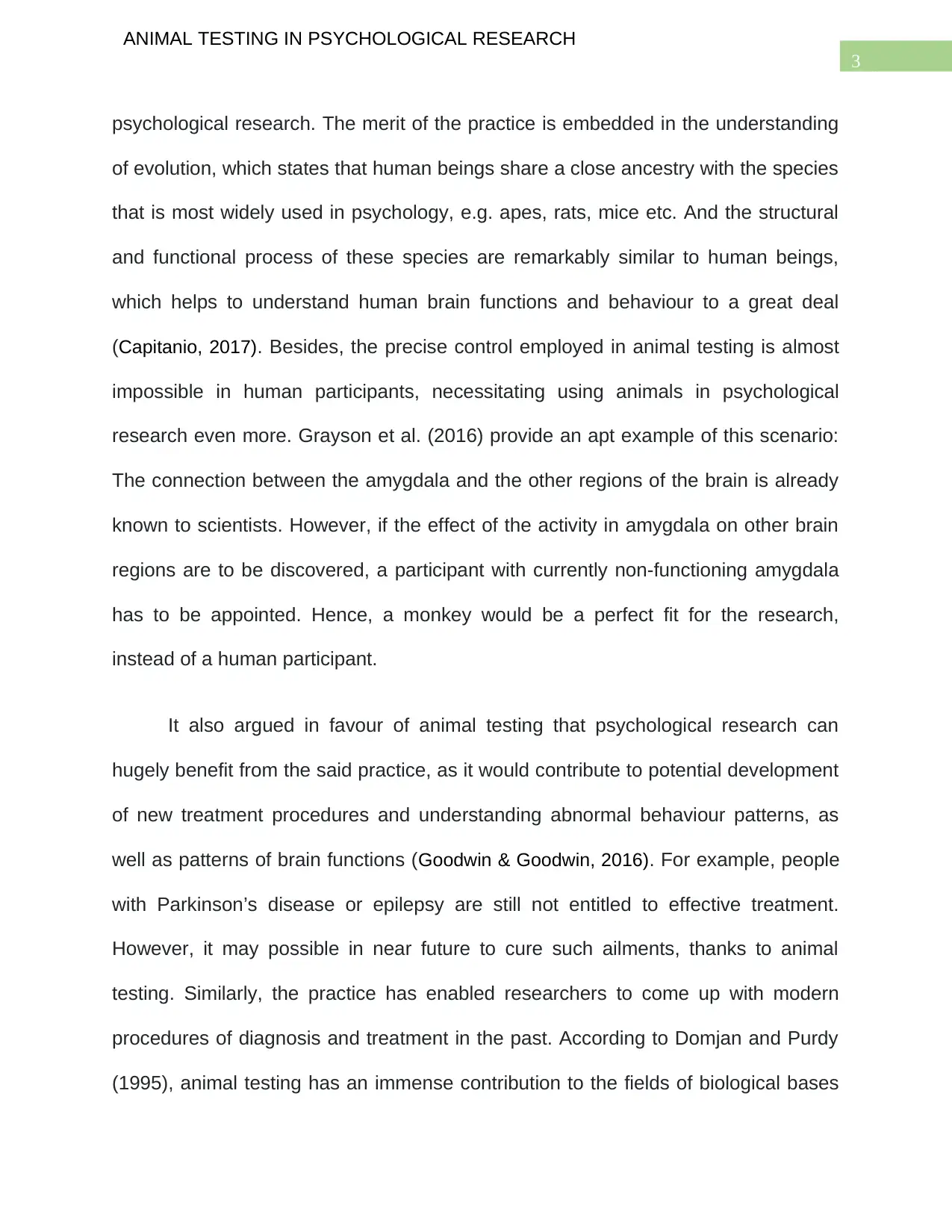
3
ANIMAL TESTING IN PSYCHOLOGICAL RESEARCH
psychological research. The merit of the practice is embedded in the understanding
of evolution, which states that human beings share a close ancestry with the species
that is most widely used in psychology, e.g. apes, rats, mice etc. And the structural
and functional process of these species are remarkably similar to human beings,
which helps to understand human brain functions and behaviour to a great deal
(Capitanio, 2017). Besides, the precise control employed in animal testing is almost
impossible in human participants, necessitating using animals in psychological
research even more. Grayson et al. (2016) provide an apt example of this scenario:
The connection between the amygdala and the other regions of the brain is already
known to scientists. However, if the effect of the activity in amygdala on other brain
regions are to be discovered, a participant with currently non-functioning amygdala
has to be appointed. Hence, a monkey would be a perfect fit for the research,
instead of a human participant.
It also argued in favour of animal testing that psychological research can
hugely benefit from the said practice, as it would contribute to potential development
of new treatment procedures and understanding abnormal behaviour patterns, as
well as patterns of brain functions (Goodwin & Goodwin, 2016). For example, people
with Parkinson’s disease or epilepsy are still not entitled to effective treatment.
However, it may possible in near future to cure such ailments, thanks to animal
testing. Similarly, the practice has enabled researchers to come up with modern
procedures of diagnosis and treatment in the past. According to Domjan and Purdy
(1995), animal testing has an immense contribution to the fields of biological bases
ANIMAL TESTING IN PSYCHOLOGICAL RESEARCH
psychological research. The merit of the practice is embedded in the understanding
of evolution, which states that human beings share a close ancestry with the species
that is most widely used in psychology, e.g. apes, rats, mice etc. And the structural
and functional process of these species are remarkably similar to human beings,
which helps to understand human brain functions and behaviour to a great deal
(Capitanio, 2017). Besides, the precise control employed in animal testing is almost
impossible in human participants, necessitating using animals in psychological
research even more. Grayson et al. (2016) provide an apt example of this scenario:
The connection between the amygdala and the other regions of the brain is already
known to scientists. However, if the effect of the activity in amygdala on other brain
regions are to be discovered, a participant with currently non-functioning amygdala
has to be appointed. Hence, a monkey would be a perfect fit for the research,
instead of a human participant.
It also argued in favour of animal testing that psychological research can
hugely benefit from the said practice, as it would contribute to potential development
of new treatment procedures and understanding abnormal behaviour patterns, as
well as patterns of brain functions (Goodwin & Goodwin, 2016). For example, people
with Parkinson’s disease or epilepsy are still not entitled to effective treatment.
However, it may possible in near future to cure such ailments, thanks to animal
testing. Similarly, the practice has enabled researchers to come up with modern
procedures of diagnosis and treatment in the past. According to Domjan and Purdy
(1995), animal testing has an immense contribution to the fields of biological bases
Secure Best Marks with AI Grader
Need help grading? Try our AI Grader for instant feedback on your assignments.
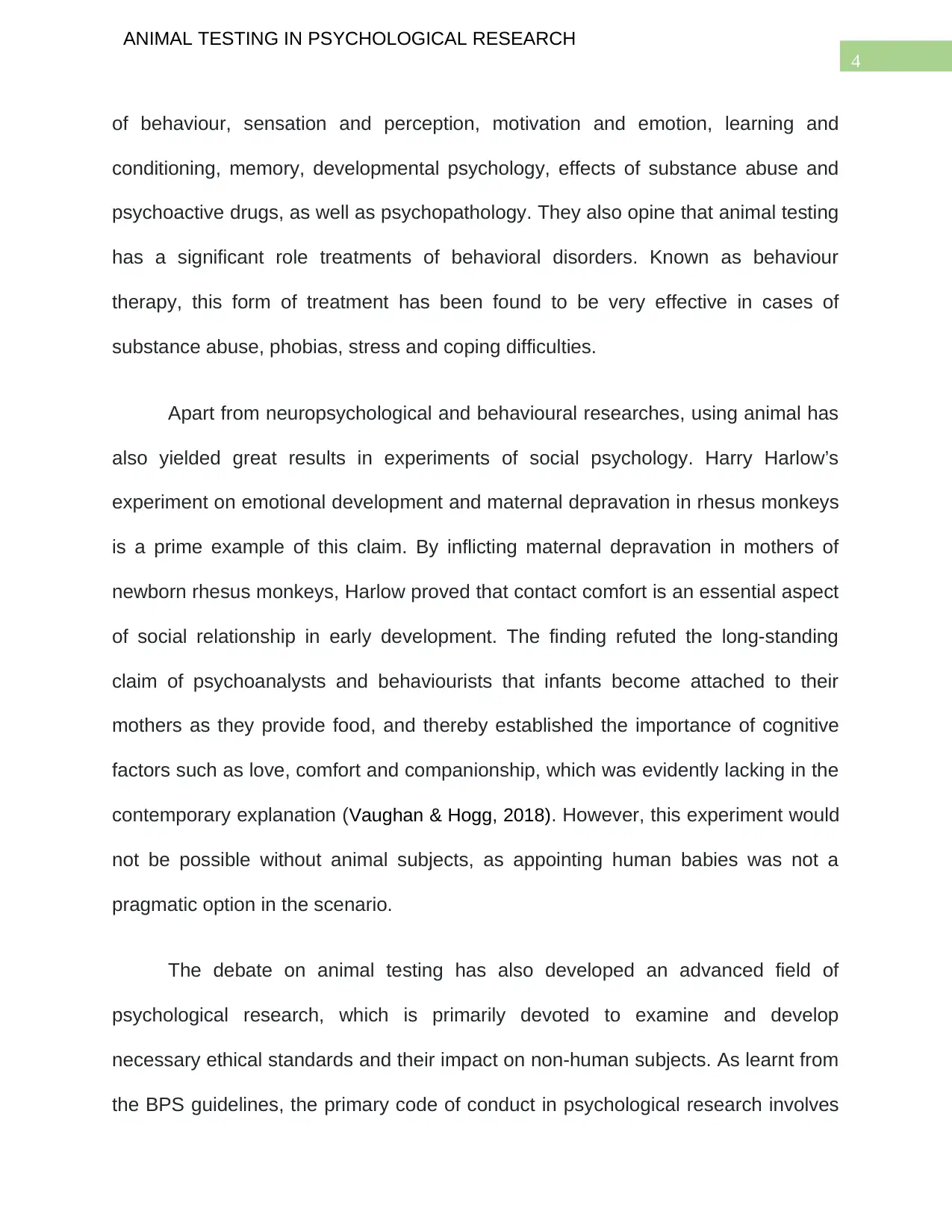
4
ANIMAL TESTING IN PSYCHOLOGICAL RESEARCH
of behaviour, sensation and perception, motivation and emotion, learning and
conditioning, memory, developmental psychology, effects of substance abuse and
psychoactive drugs, as well as psychopathology. They also opine that animal testing
has a significant role treatments of behavioral disorders. Known as behaviour
therapy, this form of treatment has been found to be very effective in cases of
substance abuse, phobias, stress and coping difficulties.
Apart from neuropsychological and behavioural researches, using animal has
also yielded great results in experiments of social psychology. Harry Harlow’s
experiment on emotional development and maternal depravation in rhesus monkeys
is a prime example of this claim. By inflicting maternal depravation in mothers of
newborn rhesus monkeys, Harlow proved that contact comfort is an essential aspect
of social relationship in early development. The finding refuted the long-standing
claim of psychoanalysts and behaviourists that infants become attached to their
mothers as they provide food, and thereby established the importance of cognitive
factors such as love, comfort and companionship, which was evidently lacking in the
contemporary explanation (Vaughan & Hogg, 2018). However, this experiment would
not be possible without animal subjects, as appointing human babies was not a
pragmatic option in the scenario.
The debate on animal testing has also developed an advanced field of
psychological research, which is primarily devoted to examine and develop
necessary ethical standards and their impact on non-human subjects. As learnt from
the BPS guidelines, the primary code of conduct in psychological research involves
ANIMAL TESTING IN PSYCHOLOGICAL RESEARCH
of behaviour, sensation and perception, motivation and emotion, learning and
conditioning, memory, developmental psychology, effects of substance abuse and
psychoactive drugs, as well as psychopathology. They also opine that animal testing
has a significant role treatments of behavioral disorders. Known as behaviour
therapy, this form of treatment has been found to be very effective in cases of
substance abuse, phobias, stress and coping difficulties.
Apart from neuropsychological and behavioural researches, using animal has
also yielded great results in experiments of social psychology. Harry Harlow’s
experiment on emotional development and maternal depravation in rhesus monkeys
is a prime example of this claim. By inflicting maternal depravation in mothers of
newborn rhesus monkeys, Harlow proved that contact comfort is an essential aspect
of social relationship in early development. The finding refuted the long-standing
claim of psychoanalysts and behaviourists that infants become attached to their
mothers as they provide food, and thereby established the importance of cognitive
factors such as love, comfort and companionship, which was evidently lacking in the
contemporary explanation (Vaughan & Hogg, 2018). However, this experiment would
not be possible without animal subjects, as appointing human babies was not a
pragmatic option in the scenario.
The debate on animal testing has also developed an advanced field of
psychological research, which is primarily devoted to examine and develop
necessary ethical standards and their impact on non-human subjects. As learnt from
the BPS guidelines, the primary code of conduct in psychological research involves
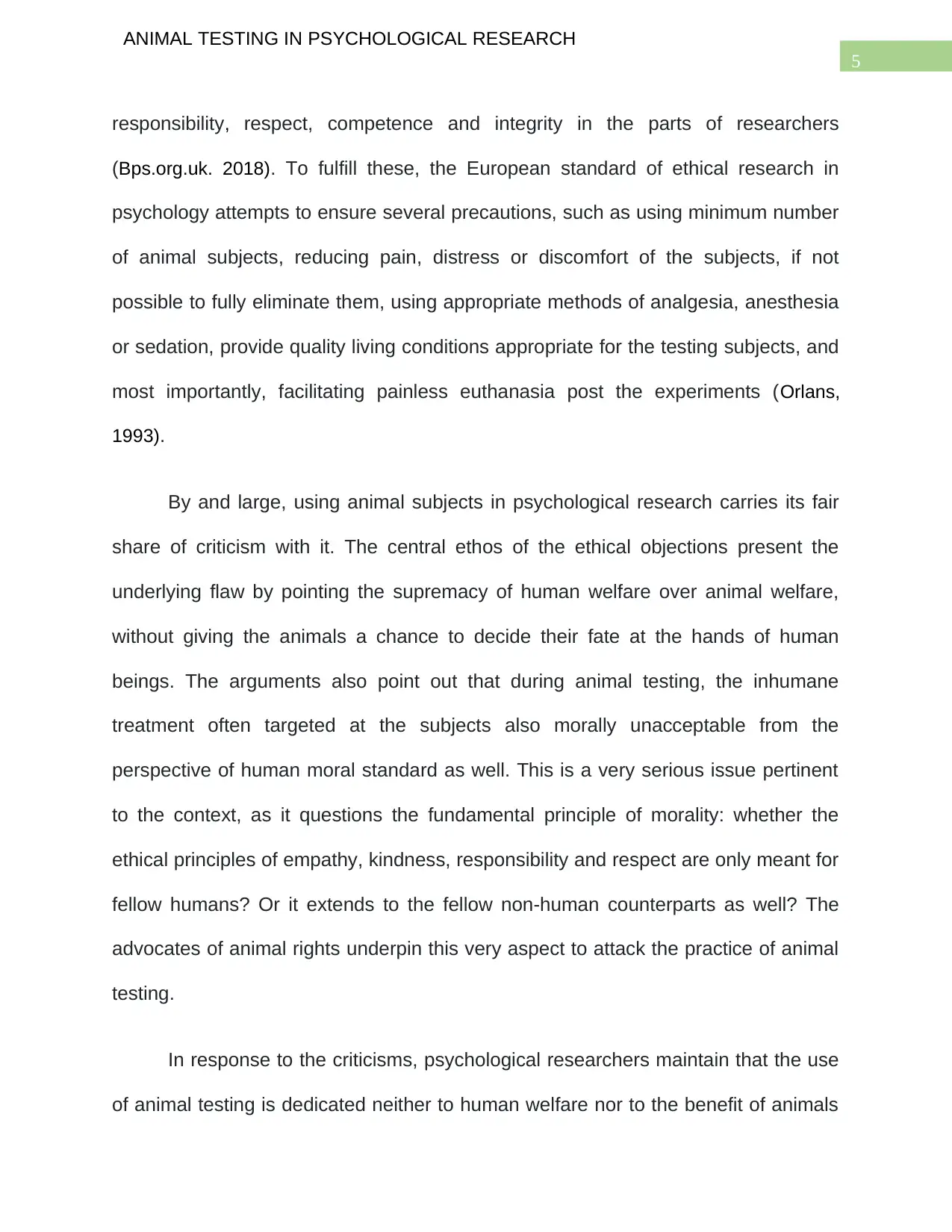
5
ANIMAL TESTING IN PSYCHOLOGICAL RESEARCH
responsibility, respect, competence and integrity in the parts of researchers
(Bps.org.uk. 2018). To fulfill these, the European standard of ethical research in
psychology attempts to ensure several precautions, such as using minimum number
of animal subjects, reducing pain, distress or discomfort of the subjects, if not
possible to fully eliminate them, using appropriate methods of analgesia, anesthesia
or sedation, provide quality living conditions appropriate for the testing subjects, and
most importantly, facilitating painless euthanasia post the experiments (Orlans,
1993).
By and large, using animal subjects in psychological research carries its fair
share of criticism with it. The central ethos of the ethical objections present the
underlying flaw by pointing the supremacy of human welfare over animal welfare,
without giving the animals a chance to decide their fate at the hands of human
beings. The arguments also point out that during animal testing, the inhumane
treatment often targeted at the subjects also morally unacceptable from the
perspective of human moral standard as well. This is a very serious issue pertinent
to the context, as it questions the fundamental principle of morality: whether the
ethical principles of empathy, kindness, responsibility and respect are only meant for
fellow humans? Or it extends to the fellow non-human counterparts as well? The
advocates of animal rights underpin this very aspect to attack the practice of animal
testing.
In response to the criticisms, psychological researchers maintain that the use
of animal testing is dedicated neither to human welfare nor to the benefit of animals
ANIMAL TESTING IN PSYCHOLOGICAL RESEARCH
responsibility, respect, competence and integrity in the parts of researchers
(Bps.org.uk. 2018). To fulfill these, the European standard of ethical research in
psychology attempts to ensure several precautions, such as using minimum number
of animal subjects, reducing pain, distress or discomfort of the subjects, if not
possible to fully eliminate them, using appropriate methods of analgesia, anesthesia
or sedation, provide quality living conditions appropriate for the testing subjects, and
most importantly, facilitating painless euthanasia post the experiments (Orlans,
1993).
By and large, using animal subjects in psychological research carries its fair
share of criticism with it. The central ethos of the ethical objections present the
underlying flaw by pointing the supremacy of human welfare over animal welfare,
without giving the animals a chance to decide their fate at the hands of human
beings. The arguments also point out that during animal testing, the inhumane
treatment often targeted at the subjects also morally unacceptable from the
perspective of human moral standard as well. This is a very serious issue pertinent
to the context, as it questions the fundamental principle of morality: whether the
ethical principles of empathy, kindness, responsibility and respect are only meant for
fellow humans? Or it extends to the fellow non-human counterparts as well? The
advocates of animal rights underpin this very aspect to attack the practice of animal
testing.
In response to the criticisms, psychological researchers maintain that the use
of animal testing is dedicated neither to human welfare nor to the benefit of animals
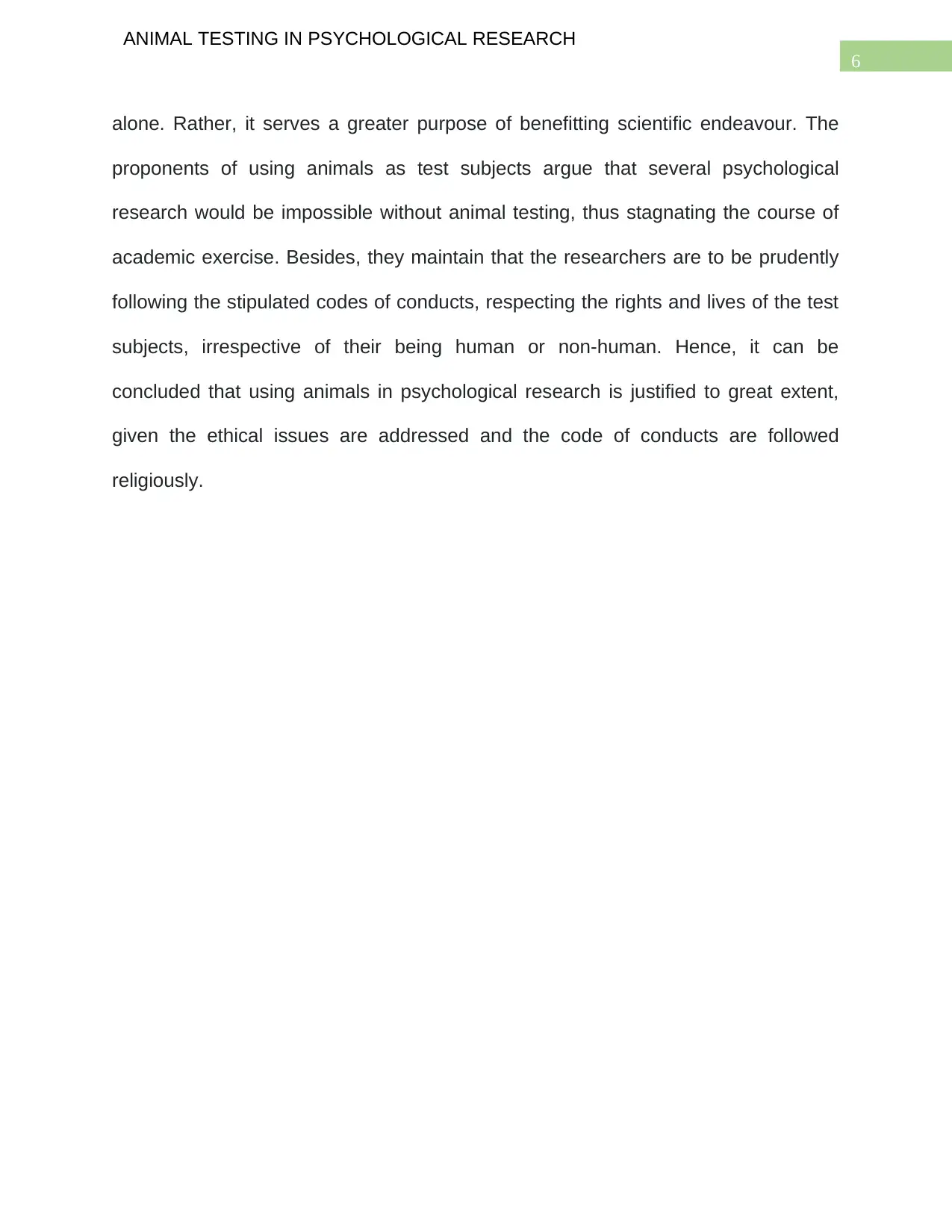
6
ANIMAL TESTING IN PSYCHOLOGICAL RESEARCH
alone. Rather, it serves a greater purpose of benefitting scientific endeavour. The
proponents of using animals as test subjects argue that several psychological
research would be impossible without animal testing, thus stagnating the course of
academic exercise. Besides, they maintain that the researchers are to be prudently
following the stipulated codes of conducts, respecting the rights and lives of the test
subjects, irrespective of their being human or non-human. Hence, it can be
concluded that using animals in psychological research is justified to great extent,
given the ethical issues are addressed and the code of conducts are followed
religiously.
ANIMAL TESTING IN PSYCHOLOGICAL RESEARCH
alone. Rather, it serves a greater purpose of benefitting scientific endeavour. The
proponents of using animals as test subjects argue that several psychological
research would be impossible without animal testing, thus stagnating the course of
academic exercise. Besides, they maintain that the researchers are to be prudently
following the stipulated codes of conducts, respecting the rights and lives of the test
subjects, irrespective of their being human or non-human. Hence, it can be
concluded that using animals in psychological research is justified to great extent,
given the ethical issues are addressed and the code of conducts are followed
religiously.
Paraphrase This Document
Need a fresh take? Get an instant paraphrase of this document with our AI Paraphraser
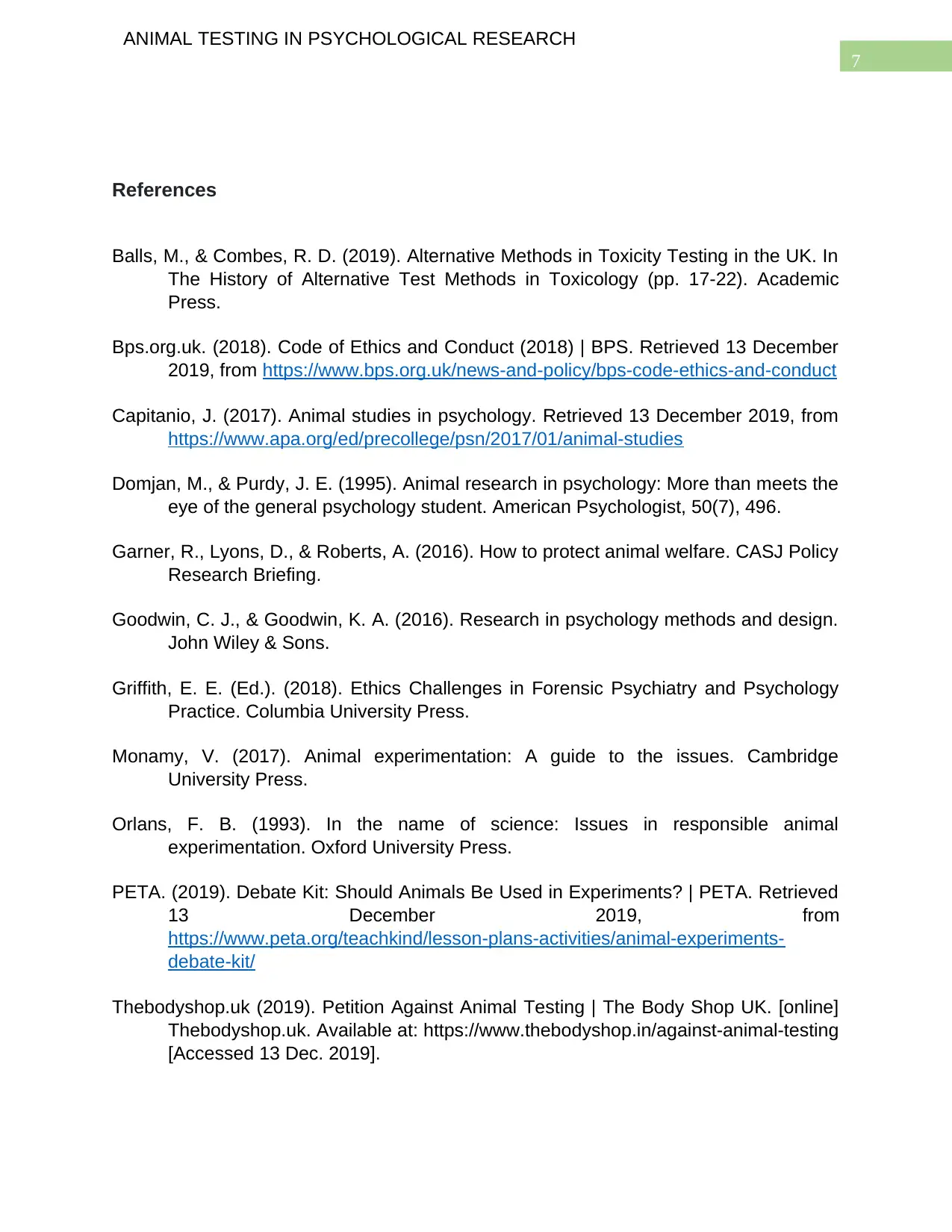
7
ANIMAL TESTING IN PSYCHOLOGICAL RESEARCH
References
Balls, M., & Combes, R. D. (2019). Alternative Methods in Toxicity Testing in the UK. In
The History of Alternative Test Methods in Toxicology (pp. 17-22). Academic
Press.
Bps.org.uk. (2018). Code of Ethics and Conduct (2018) | BPS. Retrieved 13 December
2019, from https://www.bps.org.uk/news-and-policy/bps-code-ethics-and-conduct
Capitanio, J. (2017). Animal studies in psychology. Retrieved 13 December 2019, from
https://www.apa.org/ed/precollege/psn/2017/01/animal-studies
Domjan, M., & Purdy, J. E. (1995). Animal research in psychology: More than meets the
eye of the general psychology student. American Psychologist, 50(7), 496.
Garner, R., Lyons, D., & Roberts, A. (2016). How to protect animal welfare. CASJ Policy
Research Briefing.
Goodwin, C. J., & Goodwin, K. A. (2016). Research in psychology methods and design.
John Wiley & Sons.
Griffith, E. E. (Ed.). (2018). Ethics Challenges in Forensic Psychiatry and Psychology
Practice. Columbia University Press.
Monamy, V. (2017). Animal experimentation: A guide to the issues. Cambridge
University Press.
Orlans, F. B. (1993). In the name of science: Issues in responsible animal
experimentation. Oxford University Press.
PETA. (2019). Debate Kit: Should Animals Be Used in Experiments? | PETA. Retrieved
13 December 2019, from
https://www.peta.org/teachkind/lesson-plans-activities/animal-experiments-
debate-kit/
Thebodyshop.uk (2019). Petition Against Animal Testing | The Body Shop UK. [online]
Thebodyshop.uk. Available at: https://www.thebodyshop.in/against-animal-testing
[Accessed 13 Dec. 2019].
ANIMAL TESTING IN PSYCHOLOGICAL RESEARCH
References
Balls, M., & Combes, R. D. (2019). Alternative Methods in Toxicity Testing in the UK. In
The History of Alternative Test Methods in Toxicology (pp. 17-22). Academic
Press.
Bps.org.uk. (2018). Code of Ethics and Conduct (2018) | BPS. Retrieved 13 December
2019, from https://www.bps.org.uk/news-and-policy/bps-code-ethics-and-conduct
Capitanio, J. (2017). Animal studies in psychology. Retrieved 13 December 2019, from
https://www.apa.org/ed/precollege/psn/2017/01/animal-studies
Domjan, M., & Purdy, J. E. (1995). Animal research in psychology: More than meets the
eye of the general psychology student. American Psychologist, 50(7), 496.
Garner, R., Lyons, D., & Roberts, A. (2016). How to protect animal welfare. CASJ Policy
Research Briefing.
Goodwin, C. J., & Goodwin, K. A. (2016). Research in psychology methods and design.
John Wiley & Sons.
Griffith, E. E. (Ed.). (2018). Ethics Challenges in Forensic Psychiatry and Psychology
Practice. Columbia University Press.
Monamy, V. (2017). Animal experimentation: A guide to the issues. Cambridge
University Press.
Orlans, F. B. (1993). In the name of science: Issues in responsible animal
experimentation. Oxford University Press.
PETA. (2019). Debate Kit: Should Animals Be Used in Experiments? | PETA. Retrieved
13 December 2019, from
https://www.peta.org/teachkind/lesson-plans-activities/animal-experiments-
debate-kit/
Thebodyshop.uk (2019). Petition Against Animal Testing | The Body Shop UK. [online]
Thebodyshop.uk. Available at: https://www.thebodyshop.in/against-animal-testing
[Accessed 13 Dec. 2019].

8
ANIMAL TESTING IN PSYCHOLOGICAL RESEARCH
Vaughan, G., & Hogg, M. (2018). Introduction to social psychology (8th ed.). Frenchs
Forest, N.S.W.: Pearson Education Australia.
Walsh, R. T. (2015). Introduction to ethics in psychology: Historical and philosophical
grounding. Journal of theoretical and philosophical psychology, 35(2), 69.
ANIMAL TESTING IN PSYCHOLOGICAL RESEARCH
Vaughan, G., & Hogg, M. (2018). Introduction to social psychology (8th ed.). Frenchs
Forest, N.S.W.: Pearson Education Australia.
Walsh, R. T. (2015). Introduction to ethics in psychology: Historical and philosophical
grounding. Journal of theoretical and philosophical psychology, 35(2), 69.
1 out of 9
Related Documents
Your All-in-One AI-Powered Toolkit for Academic Success.
+13062052269
info@desklib.com
Available 24*7 on WhatsApp / Email
![[object Object]](/_next/static/media/star-bottom.7253800d.svg)
Unlock your academic potential
© 2024 | Zucol Services PVT LTD | All rights reserved.





